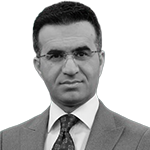They told me that the Kurdistan Coalition at Iraqi parliament only exists as far as the sign hanging on the part of the building where the Kurdistan Democratic Party (KDP) and the Patriotic Union of Kurdistan (PUK) lawmakers stay. Kurdish blocs do not have coordination or a unified position, but this does not mean that there is animosity between them. Rather, there is a sort of uncertainty among them.
They told me that there are several sensitive and sometimes decisive issues which require us to work together as a Kurdistani team in Baghdad, against two big Sunni and Shiite contingents. An ununified Kurdish position will hinder our ability to counter threats to our share of the 2020 budget.
Iraqi finance minister Fuad Hussein, a Kurd, was appointed by KDP leader Masoud Barzani. Kurdish and Arab lawmakers as well as the parliament presidency complain about his attitudes and behavior. One positive thing I heard about him was that he has said he would not do anything illegal for anyone. Rejecting and eradicating illegality is a virtue.
However, what has mainly angered parliamentarians is his rejection of requests for answers. This has been the pretext for which lawmakers have twice summoned him to parliament - but the parliament presidency have taken this pretext out of the meeting agendas. If summoned, he could be probed, and a call for no-confidence vote could be initiated. It would be a low point in Kurdish history to have the tenure of two Kurdish finance ministers ending on a no-confidence vote in Iraq (the first one being Hoshyar Zebari).
In formal meetings, Baghdad has said that Kurdistan Region’s political future is oriented towards Baghdad. They have sensed that Erbil-Baghdad relations are improving, and that Erbil wants to have as few issues possible with Baghdad.
The hot topic in Baghdad is the handover of 250,000 barrels of oil per day to Iraq, as accepted by Kurdistan Region and stipulated in 2019 budget law - but the problem is that there could be demands for the increase of this amount.
A circulating rumor is that some Kurdish lawmakers once met with Iraqi Prime Minister Adil Abdul-Mahdi and talked about this amount of oil. The Iraqi Oil Minister then joined the discussion, saying that 250,000 bpd is not enough and that Kurdistan Region should hand over more of the 650,000 bpd it produces. However, Abdul-Mahdi replied that the budget law stipulates the handover of 250,000 bpd, and that the Kurdistan Region should be allowed to pay its debts to companies - something it may be incapable of doing if it hands over more than that amount.
Some people are not tolerating the decision and have already begun efforts to increase the 250,000 bpd, lobbying for its increase in 2020 budget law. Additionally, Abdul-Mahdi’s lenience and compromise towards Kurds may end in the face of pressure from other parties.
Baghdad is not like Erbil because partisan agreements are not directly implemented and require lawmaker approval. There, agreements are turned into bills and taken to the parliament, but MPs may not do what their political parties tell them to do. When one lobbies with or tries to convince political leaders of parties to vote for a bill, they have to do the same with parliament and lawmakers.
There is a great vulnerabilty in Baghdad for Kurds, who do not have an umbrella to gather under. PUK leader Jalal Talabani used to be in Baghdad as the President of Iraq. Everyone depended on him. He also had direct contact with Masoud Barzani, then President of Kurdistan Region. Sometimes, he made decisions on behalf of Barzani as his representative in Baghdad. However, now Kurds do not know who to deal with.
Formal communication should be in place between the President of Iraq and President of Kurdistan - currently, between Barham Salih and Nechirvan Barzani. They can fully coordinate and agree on treating Salih as Nechirvan Barzani’s representative in Baghdad. Additionally, Masoud Barzani should also support such an agreement. I believe this arrangement will be approved of by other parties too.
|
|
Hiwa Jamal is a journalist and TV presenter at Rudaw Media Network. |









Comments
Rudaw moderates all comments submitted on our website. We welcome comments which are relevant to the article and encourage further discussion about the issues that matter to you. We also welcome constructive criticism about Rudaw.
To be approved for publication, however, your comments must meet our community guidelines.
We will not tolerate the following: profanity, threats, personal attacks, vulgarity, abuse (such as sexism, racism, homophobia or xenophobia), or commercial or personal promotion.
Comments that do not meet our guidelines will be rejected. Comments are not edited – they are either approved or rejected.
Post a comment